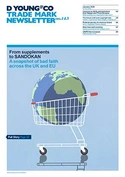PAN 1/25: change to UKIPO trade mark specification practice following SkyKick
The UK Intellectual Property Office (UKIPO) has issued new guidance covering the examination of UK trade marks following the Supreme Court judgment in SkyKick UK Ltd and Anor v Sky Ltd and Ors ([2024] UKSC 36) (SkyKick). Practice Amendment Notice 1/25 (PAN 1/25), effective immediately, means examiners will proactively consider whether a specification is “manifestly and self-evidently broad”. Where a specification is considered to be too broad an objection under bad faith will be raised during the examination process.
The UKIPO aims to take a pragmatic approach, and is not applying firm rules as to the number of classes or terms that will trigger an objection. Broad specifications do not automatically equate to bad faith but trade mark applicants must have a commercial rationale for the terms covered, particularly where specifications cover a range of seemingly unconnected goods and services. Following PAN 1/25, there will be greater scrutiny of specifications at the application stage.
Whether bad faith is raised as an objection will depend on the nature of the applicant’s business and their possible motivations for filing for the goods and services concerned. The UKIPO makes it clear that an identical specification may constitute a good faith filing for one applicant but bad faith for another, depending on the particular circumstances.
There is now an explicit requirement that applicants seek registration for goods or services which “represent fair and reasonable claims in the context of their businesses, for the purpose of denoting trade origin”. Whilst UK trade mark applicants have always had to declare a bona fide intention to use a trade mark for the specification covered when filing an application, this change in practice allows examiners to question whether this is indeed the case.
Paragraph 11 of PAN 1/25 provides particular guidance about when caution should be exercised, including:
- filing claims covering vast numbers of goods and services in large numbers of classes;
- when the terms used to describe the listed goods/services are themselves broad;
- use of class headings, particularly where class headings are used across a multitude of different classes;
- the selection of general terminology such as computer software, pharmaceuticals, clothing;
- covering all 45 classes will lead to an automatic objection, as will attempting to cover all goods in class 9.
If an objection is raised, applicants will have the opportunity to either explain the commercial rationale for their choice of specification or narrow the terms covered to a more relevant selection.
What this means for UK trade mark applicants
The change of practice does not mean broad terms and varied specifications cannot be covered. It also does not mean that an applicant cannot cover terms they do not yet use the mark on. This remains permitted and is important to encourage growing businesses to protect their trade marks. However, there should be a commercial rationale for all of the terms covered, ensuring they are fair and reasonable in relation to current and anticipated business activities. As ever, specifications should be carefully drafted.
With more stringent examination, perhaps this will lead to fewer oppositions claiming bad faith as a ground down the line.
Useful link
UKIPO statutory guidance: “PAN 1/25: required behaviour, and the impact on examination practice, following the Supreme Court’s judgment in SkyKick UK Ltd and another v Sky Ltd and others”, 27 June 2025.
Read more
